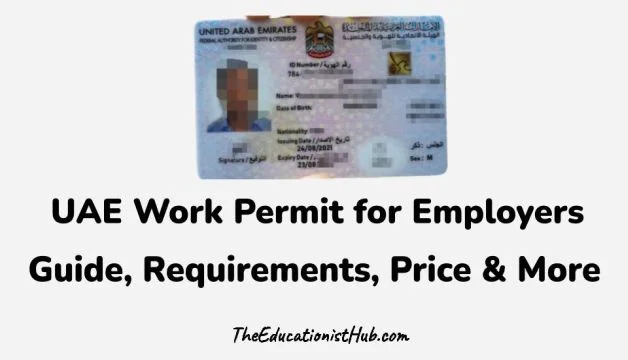Last Updated on: 20th February 2025, 05:59 pm
In the ever-evolving global business arena, the United Arab Emirates (UAE) stands as a pivotal hub for commerce and industry. Navigating the dynamic economic landscape efficiently requires a profound understanding of the UAE’s work permit system, making it crucial for businesses and HR professionals.
As of 2025, the UAE places heightened importance on diversifying its economy and attracting global talent. Staying updated on the latest regulations governing work permits becomes increasingly essential. This comprehensive guide aims to provide an overview of the UAE’s work permit system, encompassing recent changes, various permit types, and best practices for HR professionals and business owners.
UAE Visa Ban 2025: List of Countries You Need to Know
Understanding the Array of Work Permits in the UAE
In 2025, the UAE offers a diverse range of work permits tailored to its multifaceted business environment. From standard work permits to specialized permits for distinct sectors and special economic zones, each category features specific eligibility criteria, application processes, and documentation requirements.
The Ministry of Human Resources and Emiratisation (MoHRE) issues 12 types of work permits, allowing companies registered with MoHRE to recruit employees based on the nature of the job. These permits include:
- Work permit to recruit a worker from outside the UAE
- Work permit to transfer a foreign worker between establishments
- Work permit for a resident on family sponsorship
- Temporary work permit for a specific job duration
- One-mission work permit for a temporary project
- Part-time work permit for reduced working hours
- Juvenile permit for workers aged 15 to 18
- Student training and employment permit for 15-year-old students in the UAE
- UAE/GCC national permit for employing UAE or GCC nationals
- Golden visa holder permit for workers with the UAE’s Golden Residence visa
- National trainee permit for training UAE nationals
- Freelance permits for self-sponsored foreigners providing services without a specific employer.
1. Standard Work Permits
The standard work permit remains the most common type issued to foreign nationals seeking employment in the UAE. Applicants must have a confirmed job offer from a UAE-based company, with the employer sponsoring the permit. The process involves obtaining preliminary approval from MoHRE, an entry permit, a medical test, and finally, the work permit and residency visa.
Eligibility Criteria:
- Employment offer from a UAE-based company.
- Relevant qualifications and experience.
- Successful completion of a medical fitness test.
Application Process:
- Employer initiates: Obtain employment quota approval from MoHRE.
- Entry Permit: Upon approval, issue an entry permit for the employee.
- Medical Test and Emirates ID: The employee undergoes a medical test and applies for an Emirates ID.
- Work Permit and Residency Visa: Apply for the actual work permit and residency visa.
Required Documentation:
- Passport copy.
- Photographs.
- Academic and professional certificates.
- Employment contract.
- Entry permit.
- Medical test results.
2. Sector-Specific Permits
To attract expertise in specific fields, the UAE introduces sector-specific permits for healthcare, education, and construction. These permits, designed for skilled professionals, require additional certifications or qualifications relevant to the sector. The application process follows the standard work permit process, with additional sector-specific documentation.
Eligibility Criteria:
- Relevant sector-specific qualifications.
- Licensing (for regulated professions like healthcare).
- Employment offer from a UAE-based company in the specific sector.
Application Process:
- Obtain approval from the relevant sector authority.
- Follow the standard work permit application process.
Required Documentation:
- All standard work permit documents.
- Additional certifications or licenses were specific to the sector.
3. Special Economic or Free Zone Permits
Special Economic Zones (SEZs) in the UAE, such as Dubai Internet City and Abu Dhabi Global Market, offer specific work permits. These zones provide benefits like tax exemptions and 100% foreign ownership. Work permits in SEZs have streamlined processes and aim to attract businesses in sectors like technology, finance, and media.
Application Process:
- Request the employee’s work permit and residence visa through the relevant free zone authority.
Documentation:
- Comply with guidelines provided by the specific free zone authority.
Here’s How to Open Bank Account in UAE Online
New Categories of Work Permits in UAE (Introduced in 2024)
The UAE introduces innovative permit categories to attract global talent and support its diversifying economy. These categories, tailored to specific sectors and strategic goals, have distinct eligibility criteria, application processes, and required documentation.
Eligibility Criteria:
- Specific to each new category (e.g., tech visas may require proof of expertise in emerging technologies).
- Tailored to support strategic sectors identified by the UAE government.
Application Process:
- Specialized Application: Apply through dedicated portals or government entities.
- Verification and Approval: Undergo a specialized verification process tailored to the category.
- Visa Issuance: Upon approval, the visa is issued.
Required Documentation:
- Varies based on the specific category but generally includes passport, professional qualifications, and proof of expertise or contribution to the strategic sector.
Risks of Employing Without a Valid Work Permit
According to the UAE Labour Law, employing a worker without a valid work permit is illegal and entails significant risks for both employers and employees. Understanding these risks is crucial for ensuring compliance and avoiding legal complications.
For Employers:
- Legal Penalties and Fines: Substantial fines for violating labor laws.
- Business License Revocation: Possible closure for severe or repeated violations.
- Reputational Damage: Harm to business reputation and brand image.
- Legal Proceedings: Time-consuming and costly legal processes.
- Restrictions on Future Hiring: Limitations on hiring foreign employees.
- Deportation of Employees: Responsibility for covering deportation costs.
For Employees:
- Deportation: Risk of deportation from the UAE.
- Legal Sanctions: Fines and imprisonment for working illegally.
- Ineligibility for Future Work: Difficulty obtaining a future work permit.
- Lack of Legal Protection: Absence of legal protection under UAE labor laws.
- Difficulty in Accessing Services: Limited access to essential services without a valid work permit.
Requirements for Obtaining a Work Permit
To apply for a work permit in the UAE:
- The establishment must have a valid trade license.
- The authorized signatory must apply.
MoHRE may refrain from issuing or renewing work permits for establishments that provide incorrect documents, are fictitious, do not exercise their registered activity, or are non-compliant with labor market regulations.
Canceling a Work Permit:
- The establishment must acknowledge payment of all worker entitlements.
- The worker’s signature must be on the permit cancellation form.
Cost of Work Permits in UAE:
- Ranges from AED 250 to AED 3,450, depending on the company’s classification (A, B, or C).
- Classification reflects compliance with labor laws, the Wages Protection System, and other relevant regulations.
For updated fees, refer to Cabinet Resolution No. 37 of 2022.

Researcher, Blogger, Content Writer, Online Marketing Expert, Aptitude Test & Admissions Expert, Career Counselor.
PEC REGISTERED. ENGINEER. (NED University of Engineering & Technology)
CEO / Founder (The Educationist Hub)




I am from Afghanistan i want immagration to there thank you